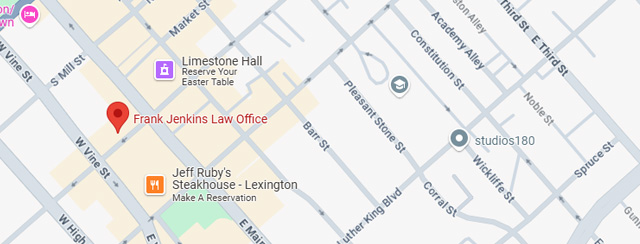Workers’ compensation insurance in Kentucky is meant to assist injured workers and those suffering from occupational diseases with their medical bills. Employees in the workers’ comp program are entitled to reimbursement for expenses they pay in the process of receiving medical treatment, including reasonable travel expenses, the Kentucky Department of Workers’ Claims (DWC) clearly states.
The worker does not make co-payments for medical treatment under workers’ compensation. All payments are the responsibility of the employer (usually through an insurer). The DWC adopts fee schedules that set forth what physicians, hospitals and pharmacists may charge for their services. Medical providers are prohibited from engaging in “balance billing”by charging workers separately for amounts in excess of those set forth in the medical fee schedules.
If your medical providers or employer violates requirements of the workers’ compensation program, the Frank Jenkins Law Office can help you. Call our Kentucky workers’ comp lawyerstoday at 859-389-9344 or reach us through our online contact form. We’ll provide an initial consultation for free, and we won’t collect a fee from you until we obtain an appropriate workers’ compensation settlement.
Medical Care in the Kentucky Workers’ Compensation System
Once an injured or ill worker enters the Kentucky workers’ compensation system for medical treatment, his or her medical care becomes fully reimbursable — that is, paid for. Reimbursable medical expenses for treatment of work-related injuries and illness include the services of medical doctors, chiropractors, hospitals and other licensed providers. In fact, the employer’s insurance company is obligated to pay for the reasonable and necessary treatment of the worker’s occupational injury for life, unless future medical benefits are waived.
But, the medical care a worker receives and how they receive it is highly regulated.
At the start, to settle a workers’ comp claim, the administrative law judge (ALJ) who presides over the claim may order the worker to be evaluated by physicians at either the University of Louisville Medical School or the University of Kentucky Medical School. Such examinations are conducted in all hearing loss claims and all occupational disease claims.
The worker’s employer may also have the claimant examined by a physician of the employer’s choosing. The appointment must be at a reasonable time and the employer must reimburse their employee’s travel expenses, but the employee must comply or give up the claim.
An injured employee in the workers’ compensation system “generally has the right to choose” a treating physician without interference from their employer, the Kentucky Department of Workers’ Claims (DWC) says. The designated physician will be the injured worker’s primary treating physician and will be responsible for referring the employee to additional medical care providers as necessary. Depending on the nature of the worker’s injury or illness, the primary treating physician may be a general practice physician, surgeon, psychologist, optometrist, dentist, podiatrist, osteopath or chiropractor.
If for some reason the employee is unhappy with the primary treating physician, they may change it once without questions or permission. But additional changes require permission from the employer or its insurance carrier or the approval of an ALJ.
Sometimes, medical care in the Kentucky workers’ compensation system will be provided through a managed care program. This requirement was adopted in 1994 as a medical cost-containment measure. Therefore, injured and ill workers still have a choice of physician as long as it is within the confines of the provider network.
If a managed care plan physician recommends that the injured or ill worker undergo surgery, the worker may obtain a second opinion from an outside physician at the expense of the employer. Employees in the workers’ comp system may also obtain medical services outside the managed care plan when:
- It is emergency care
- The employee chooses to continue care with a physician who provided emergency care
- A plan physician makes a referral
- Necessary treatment is not available through the plan
- Treatment with a non-network physician was begun prior to implementation of the plan.
Utilization Review and Medical Bill Audits
Another facet of the Kentucky workers’ compensation system is the utilization review, which is generally defined by the DWC as “a review of the medical necessity and appropriateness of medical care and services for purposes of recommending payments for compensable injuries or diseases.” The program also requires medical bill audits, a review of all medical bills for services that have been provided to ensure compliance with adopted fee schedules. For example, the DWC establishes a medical fee schedule for physicians, as well as a hospital fee schedule.
When a claim is selected for utilization review, medical personnel review the treatment or service for medical necessity and appropriateness. If the initial reviewer detects a problem, the claim is referred to a licensed physician, who can render denials of treatment. A written notice of denial must be issued to the treating physician and the injured or ill worker within 10 days of the initiation of the utilization review. The notice of denial must include the reason for the denial and a statement of appeal rights.
If the injured or ill worker wishes to appeal a denial of medical services, he or she must request reconsideration within 14 days of receipt of the written notice of denial. A physician other than the one who issued the denial will review the case. If the appellate decision is not satisfactory, the worker may request a “specialty or sub-specialty review,” which is the final level of appeal. This decision must be rendered within 10 days of the request for specialty review.
Compensable claims are subject to utilization review when any of the following occur:
- A medical provider requests pre-authorization of a medical treatment or procedure
- Notification of a surgical procedure or resident placement pursuant to a designated physician’s treatment plan is received
- The total medical costs cumulatively exceed $3,000
- The total lost work days cumulatively exceed 30 days, or
- An administrative law judge (ALJ) orders a review.
Reviews and restrictions on medical care can complicate an injured or ill workers’ life while they should be putting all of their efforts toward recovery. Mistakes or inability to comply with requirements could jeopardize appropriate benefit payments. This is where the assistance of an experienced Kentucky workers’ compensation attorney can help.
Workers’ Comp Medical Benefits Dispute? Our Lawyers Can Help
If you or a family member needs legal assistance with a workers’ compensation claim, or if you have questions about appealing a decision, the Frank Jenkins Law Office can offer assistance. Contact one of our experienced Lexington workers’ comp lawyers today at 859-389-9344 or through our online contact form.












